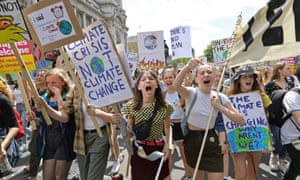Curbing meat and dairy consumption is critical to tackling global
heating. But the issue must not be reduced to solely a question of
personal choices
It’s
easy to despair. The scale of the problems we face looms as large as
the shadows cast by unpalatable leaders. What stirs some into action for
the first time leaves others feeling simply overwhelmed. What can any
one person do?
When the UN’s Intergovernmental Panel on Climate Change put out a landmark report this week, warning that global heating is damaging the ability of the land to sustain humanity, many news outlets summarised it with the injunction: eat less meat. It was an easily relatable way into the story and told audiences what they could do to help – an essential part of tackling the climate crisis. It was certainly a more accessible angle than the lengthy report’s advice on issues such as smallholders and soil protection.
The danger of such an approach is that great demands can become reduced to individual purchasing decisions, conveniently freeing politicians from making unpopular choices or businesses from reducing their profits. It isn’t a coincidence that so many issues are framed as purely personal choices. It is easier to blame dietary ignorance, sloth and greed for soaring levels of obesity than to tackle an obesogenic environment and the powerful “big food” lobby which has helped to create it. It is easier to encourage individuals to take up meditation than to tackle the social and economic factors contributing to many people’s mental health issues.
Deforestation has soared in the Amazon, the world’s largest rainforest, under Jair Bolsonaro’s watch. A new report suggests
that leases from the Trump administration of public lands and waters
for oil and gas drilling could lead to more carbon emissions than the
entire European Union contributes in a year. In this context, focusing
on dinner plates can sound trivial. Relying on the conscience of
individual shoppers is not a substitute for governmental commitments to
drastically curb carbon emissions and introduce the laws, taxes and
investment which can produce a more sustainable society.When the UN’s Intergovernmental Panel on Climate Change put out a landmark report this week, warning that global heating is damaging the ability of the land to sustain humanity, many news outlets summarised it with the injunction: eat less meat. It was an easily relatable way into the story and told audiences what they could do to help – an essential part of tackling the climate crisis. It was certainly a more accessible angle than the lengthy report’s advice on issues such as smallholders and soil protection.
The danger of such an approach is that great demands can become reduced to individual purchasing decisions, conveniently freeing politicians from making unpopular choices or businesses from reducing their profits. It isn’t a coincidence that so many issues are framed as purely personal choices. It is easier to blame dietary ignorance, sloth and greed for soaring levels of obesity than to tackle an obesogenic environment and the powerful “big food” lobby which has helped to create it. It is easier to encourage individuals to take up meditation than to tackle the social and economic factors contributing to many people’s mental health issues.
But it is a critical part of the solution. Reining in the rise in global temperatures does not depend on Brazil curbing its destruction of the world’s largest rainforest, or on European holidaymakers flying less, or on the US cutting back on fossil fuels. It depends on all these things, and much more – as the IPCC report so devastatingly shows.
Governments and businesses follow as well as lead. They will not introduce policies which they consider political or commercial suicide. But nor will they persist with those which cost them too much support. The history of social movements tells us that ideas which seem radical and bizarre – like granting women the right to vote – can quickly become regarded as normal and even self-evident.
When Greta Thunberg, then an unknown teenager, decided to protest about the climate crisis outside the Swedish parliament, it led to one and a half million students around the world participating in a school strike. The head of Opec called the movement “perhaps the greatest threat” to the oil industry.
As Ms Thunberg herself insists, “You cannot have system change without individual change.” In climate activism the “think global, act local” link is both long-established and tangible. But it is also a useful model for other campaigning. However grim the situation, inaction will make it worse. We should be suspicious of attempts to reduce issues to individual consumer choices; mindful of the need for personal changes; and awake to the chance that even small shifts may trigger much greater ones.

No comments:
Post a Comment